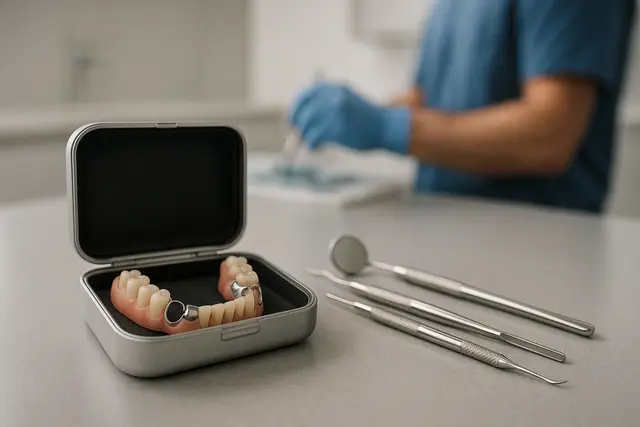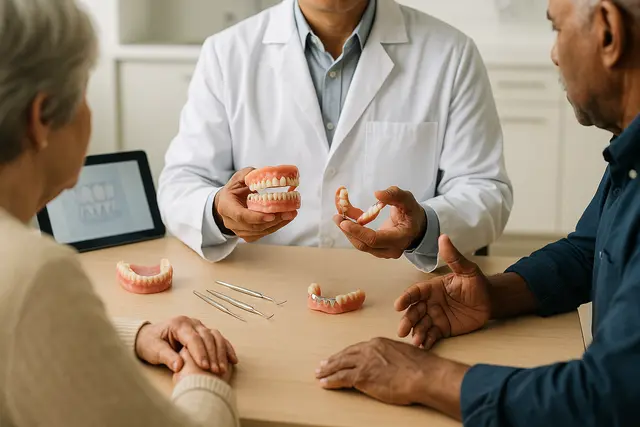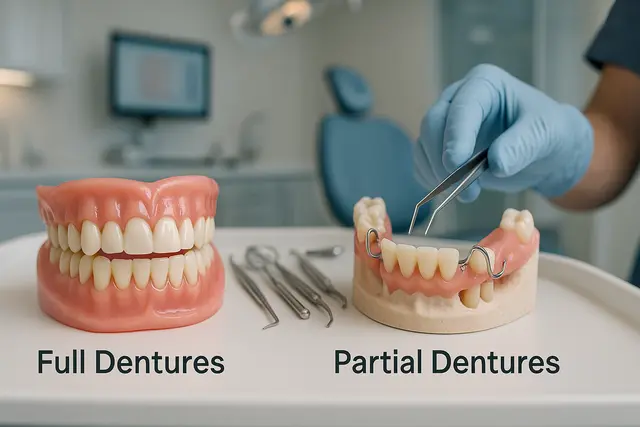Prosthodontics
5 min read
Nov 04, 2025
Permanent Partial Dentures Overview: Your Guide to Long-Term Tooth Replacement
Missing teeth can affect more than just your appearance, they can impact how you eat, speak, and feel about yourself. For those who still have some healthy teeth remaining, permanent partial dentures offer a reliable and natural-looking solution to restore both function and confidence. This guide breaks down everything you need to know about them, from types and benefits to how they’re made and maintained.

What Is a Partial Denture and Who Is It For
If you’ve got a few missing teeth but still have some solid ones holding on strong, a partial denture might be the answer you’ve been looking for. A partial denture is a custom dental appliance designed to replace one or more missing teeth. Unlike a full denture, which replaces a complete set, a partial fills the gaps and works alongside your natural teeth.
People with missing teeth often feel self-conscious, and it’s not just about looks. Missing teeth can affect your bite, your speech, and even your ability to chew your favorite foods. A well-made partial helps restore all of that, comfortably and confidently.
Understanding How a Partial Works
So, how do partial dentures work? These dental appliances are designed to attach securely to your remaining healthy teeth. Most partials have a gum-colored base, artificial teeth that look like natural teeth, and clasps that gently grip your real teeth to keep the denture in place. Some types even use hidden attachments or dental implants for added stability.
The result? You can eat and speak more naturally again without worrying about a gap or shifting teeth. Partial dentures can help you feel like yourself again.
Choosing the Best Partial Denture for You
When it comes to the best partial denture, it really depends on your needs, your budget, and the condition of your remaining teeth. A few common options include:
Cast metal partial: Strong, long-lasting, and often considered the gold standard. It uses metal frameworks for support.
Flexible partial denture: Made of softer materials for comfort and aesthetics. A good choice for people with sensitive gums.
Acrylic partials: Usually a temporary option but affordable if you're looking for a short-term fix.
Each type of partial denture comes with its own set of pros and cons. Your dentist can help you choose the best one based on how many teeth you’ve lost, where they’re located, and what kind of fit you want.
Exploring the Different Types of Dentures
There are several dental solutions to restore your smile. Beyond partials, you’ll hear about things like complete dentures, full dentures, implant-supported dentures, and even immediate dentures. Here's a quick rundown:
Complete dentures: Used when all teeth are missing.
Full dentures replace: Both the upper and lower arches, often used by those with total tooth loss.
Removable partial dentures: Best for patients who still have some natural teeth left.
Fixed partial: Often called a dental bridge, this uses crowns to anchor false teeth in place.
Implant-supported dentures: Attach to dental implants for extra security.
Immediate dentures: Given right after extractions to keep you smiling during healing.
Understanding the main types helps you make an informed decision and prepare for what to expect.
Permanent Partial Dentures and Why They Matter
Now let’s talk about permanent partial dentures. While many dentures are removable, a permanent partial offers a longer-term solution that feels more secure. They’re designed to last for years with proper care and can be a game-changer for people with several missing teeth but enough remaining healthy teeth to support a stable fit.
This permanent solution blends in seamlessly with your natural teeth and is usually made with strong materials like metal or high-grade resin. Some patients even combine this option with dental implants for an even more secure fit.
Temporary vs. Permanent Partial Dentures
Temporary vs. permanent: it’s a decision that depends on your treatment plan and goals. Temporary dentures are often used as a placeholder while your mouth heals or while waiting for permanent dental work.
Permanent partials are more durable, custom-fit, and made to blend in with your existing teeth. If you’re looking for something to restore your smile for the long haul, the permanent route is usually the way to go.
Get a Partial Denture That Fits Your Life
It’s not just about filling gaps, it’s about regaining confidence. When you get a partial denture that fits right, it feels like you’ve got your life back. Eating is easier. Smiling feels natural again. You stop worrying about people noticing your missing teeth.
The process typically starts with a dental exam, impressions, and fittings to make sure everything aligns just right. Your dentist might recommend a particular partial denture option based on your remaining teeth and gums.
How Dentures Are Made and What to Expect
Dentures are made with precision and care. A mold is taken of your mouth to design a perfect fit. Depending on the type of dental work needed, your dentist might take additional steps to shape the denture base, fit clasps, or test comfort levels.
Partial dentures are made to feel as close to natural as possible. With modern materials and techniques, they look real, feel stable, and restore your ability to chew without discomfort.
Partial Dentures Are Made for Comfort and Function
Partial dentures are made with your daily life in mind. Whether you’re talking, eating, or just laughing with friends, these dental appliances stay in place and support the teeth you’ve got left. Some patients say they forget they're even wearing them after a few days of getting used to the feel.
And let’s not forget how much they help your oral health. They stop your teeth from shifting and protect your gums from uneven pressure.
Restore Your Smile with Confidence
Your smile says a lot about you. When you’re missing teeth, it can affect your confidence, how you speak, and even how you interact with people. Dentures help restore your smile, so you can show up fully in your life, at work, in photos, or out with friends.
Whether it’s a cast metal partial, a flexible design, or a removable dental option, the right fit makes all the difference.
Why Partial Dentures Are a Great Choice
Partial dentures are an excellent solution for people with missing teeth who still have several healthy teeth left. They’re more affordable than full implants and less invasive than some fixed bridges.
Plus, partial dentures can help you maintain a natural bite and improve your quality of life. With regular dental checkups and proper care, partial dentures can last many years.
Tips for Caring for Your Partial Dentures
To keep your new dentures in top shape, here’s what you’ll want to do:
Clean them daily with a soft denture brush.
Avoid using hot water that could warp the material.
Store them safely when not in use.
See your dentist regularly for adjustments and checkups.
Use a gentle, non-abrasive cleanser.
Proper care keeps your dentures looking good and lasting longer. In fact, well-made partial dentures can last up to 5–10 years, sometimes longer.
Who Is a Good Candidate for Partial Dentures?
Partial dentures are ideal for individuals who are missing one or several teeth but still have healthy natural teeth remaining. These remaining teeth help anchor the partial and provide stability. Candidates should have good gum health and sufficient bone support. Partial dentures are especially useful for those who want a non-surgical, affordable solution to restore chewing ability, prevent teeth from shifting, and enhance their smile without replacing an entire arch.
What Is the Difference Between Temporary and Permanent Partial Dentures?
Temporary partial dentures are transitional appliances used while your mouth heals after extractions or during preparation for a permanent solution. They offer short-term function and aesthetics but are not built for long-term durability. Permanent partial dentures, on the other hand, are custom-designed for long-term wear, made with stronger materials, and fit more precisely. They are intended to restore function, comfort, and appearance over many years with proper maintenance.
What Types of Partial Dentures Are Available?
Partial dentures come in several styles to suit different needs. Cast metal partials offer excellent strength and a precise fit, making them a durable long-term choice. Flexible partial dentures use softer, lightweight materials, providing comfort and a natural look for those with sensitive gum tissue. Acrylic partials are typically used as temporary solutions due to their affordability and ease of adjustment. The right option depends on your remaining teeth, oral health, and budget.
How Do Partial Dentures Improve Oral Function and Health?
Partial dentures help restore your ability to chew, speak, and smile with confidence by filling gaps left by missing teeth. They also prevent surrounding teeth from shifting into empty spaces, which can lead to bite problems, gum irritation, and changes in facial structure. With proper fit and care, partial dentures support your oral health by distributing bite pressure evenly and maintaining natural jaw and gum function. Regular dental checkups ensure long-term comfort and performance.
Read Next
Related Posts

Prosthodontics
Differences Between Zirconia and Acrylic Dentures: Benefits, Drawbacks, and Tips
Choosing between zirconia and acrylic for dental implants can feel overwhelming, especially when both materials offer unique advantages. This guide breaks down the essential differences, benefits, and limitations of each option to help you make a more confident, informed decision about your dental restoration journey.
5 min read
Nov 03, 2025

Prosthodontics
Dentures vs. Partial Dentures Pros and Cons: Helping You Make the Best Choice
Tooth loss can impact everything from your self-confidence to your ability to enjoy your favorite foods. Fortunately, modern dentistry offers practical solutions that restore both function and aesthetics. Two of the most common options are full dentures and partial dentures, each with its own advantages and limitations.
5 min read
Nov 03, 2025

Prosthodontics
Partial Dentures vs. Full Dentures Comparison: What Works Best for Your Situation
Choosing between partial and full dentures is an important step in restoring both your smile and confidence. With each option designed to meet different dental needs, understanding their differences can help you make the right decision for your oral health and lifestyle.
5 min read
Nov 03, 2025
Don’t have time to research every dentist around you?
See why 30k+ patients trusted us